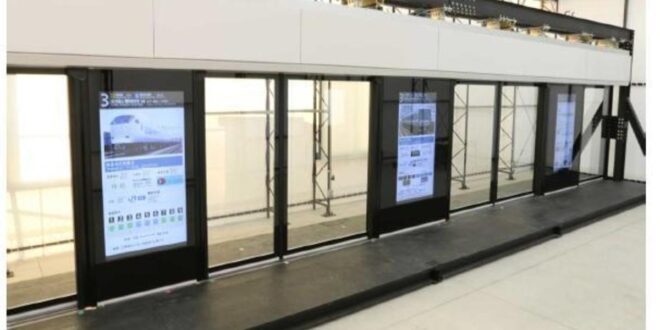“The World’s Most Advanced Train Station” Opens in Osaka
The western Japanese city of Osaka is now home to what’s being described as the world’s most advanced train station. The “Umekita underground exit” extension of the existing Osaka Station aims to add an additional 12,000 passengers to the station’s daily footfall of approximately 300,000. The new wing is located eight minutes away via the concourse and is intended to provide quicker access to Kansai International airport and the neighboring prefecture of Wakayama, a popular tourism destination.
Stationmaster Hiroyuki Watanabe expressed his excitement when the four new train platforms opened for service in mid-March, stating that this was not just a different kind of train station, but a next-stage station. Local bar owner Masao Tejima added that the new station would have a significant impact on foot traffic, especially post-pandemic.
The innovative centerpiece of the station is its floor-to-ceiling panels that, similar to room dividers found in traditional Japanese homes, slide on grooves in the floor to protect passengers from falling onto the tracks. Additionally, these digital panels display helpful details about oncoming trains and routes and can slide into different configurations to suit varying door layouts of trains.
Japanese train and subway operators have invested heavily over the last decade in installing protective platform barriers, from low-cost cables that descend upon the train’s arrival to $9 million, five-foot-tall sliding safety gates. The use of platform barriers has contributed to rising fares, but it’s also a necessary tradeoff given the frequent incidents of passengers tumbling onto tracks, often inebriated, distracted by their smartphones, or suffering from sight impairment. According to a report by Dai-Ichi Life Research Institute, the wider use of platform barriers has led to a reduction in the incidence of falls, from 3,730 in 2014 to 1,370 in 2023.
The new Osaka Station extension is brimming with other high-tech features. For instance, some riders need not scan a prepaid train pass or feed a ticket into a turnstile. They can simply walk through a wide-open walkway fitted with facial recognition scanners. Though still in experimental use, the system is available only to JR West employees and commuter pass-holders.
Japanese transit hubs can often be challenging to navigate, and Osaka’s new station extension now allows users to enter their destination on a smartphone app to receive personalized guidance. Each user is assigned a unique cartoon icon (e.g., an onion or a bunch of grapes) that will appear discreetly on station signs as they make their way through the station, acting like a trail of bread crumbs.
Queuing lines for lavatories may also be a thing of the past, as large digital bathroom signs now show not only the location of the facilities for men, women, and people with disabilities but also indicate how many unoccupied stalls are available in each.
In short, the new Osaka Station extension provides travellers with an experience that’s both safer and more hi-tech.
 Mind Uncharted Explore. Discover. Learn.
Mind Uncharted Explore. Discover. Learn.


